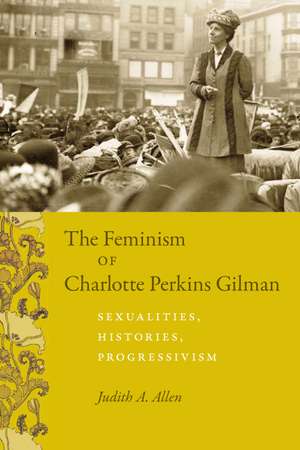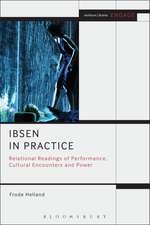The Feminism of Charlotte Perkins Gilman: Sexualities, Histories, Progressivism: Women in Culture and Society
Autor Judith A. Allenen Limba Engleză Hardback – 17 sep 2009
Famous for her short fiction—most notably “The Yellow Wallpaper”—Charlotte Perkins Gilman also produced a vast body of nonfiction in tandem with her work as a Progressive-era feminist reformer. Rooted in groundbreaking research on Gilman’s extensive correspondence, publications, and speeches, this keenly argued intellectual biography reconstructs her controversial output and the heady context in which she produced it.
Judith Allen provides the first comprehensive assessment of Gilman’s complicated feminism by exploring the renowned writer’s theories of sexuality and evolutionary analyses of androcentric—or male-dominated—culture. These ideas, Allen shows, informed Gilman’s many contributions to the suffrage movement, the fight to abolish regulated prostitution, and efforts to legalize birth control. Restoring a previously overlooked public intellectual to her preeminent place in Progressive-era politics and the history of feminism at home and abroad, Allen’s landmark study provides the fullest account available of Gilman’s consequential life and profoundly influential work.
Judith Allen provides the first comprehensive assessment of Gilman’s complicated feminism by exploring the renowned writer’s theories of sexuality and evolutionary analyses of androcentric—or male-dominated—culture. These ideas, Allen shows, informed Gilman’s many contributions to the suffrage movement, the fight to abolish regulated prostitution, and efforts to legalize birth control. Restoring a previously overlooked public intellectual to her preeminent place in Progressive-era politics and the history of feminism at home and abroad, Allen’s landmark study provides the fullest account available of Gilman’s consequential life and profoundly influential work.
Din seria Women in Culture and Society
-
 Preț: 208.98 lei
Preț: 208.98 lei -
 Preț: 175.67 lei
Preț: 175.67 lei -
 Preț: 195.69 lei
Preț: 195.69 lei -
 Preț: 298.82 lei
Preț: 298.82 lei -
 Preț: 290.55 lei
Preț: 290.55 lei -
 Preț: 271.85 lei
Preț: 271.85 lei -
 Preț: 216.24 lei
Preț: 216.24 lei -
 Preț: 288.42 lei
Preț: 288.42 lei -
 Preț: 294.96 lei
Preț: 294.96 lei -
 Preț: 345.70 lei
Preț: 345.70 lei -
 Preț: 237.92 lei
Preț: 237.92 lei -
 Preț: 260.52 lei
Preț: 260.52 lei -
 Preț: 357.06 lei
Preț: 357.06 lei -
 Preț: 327.03 lei
Preț: 327.03 lei -
 Preț: 294.96 lei
Preț: 294.96 lei -
 Preț: 247.66 lei
Preț: 247.66 lei -
 Preț: 291.31 lei
Preț: 291.31 lei -
 Preț: 287.45 lei
Preț: 287.45 lei -
 Preț: 331.84 lei
Preț: 331.84 lei -
 Preț: 291.49 lei
Preț: 291.49 lei -
 Preț: 277.69 lei
Preț: 277.69 lei -
 Preț: 317.33 lei
Preț: 317.33 lei -
 Preț: 294.37 lei
Preț: 294.37 lei -
 Preț: 260.64 lei
Preț: 260.64 lei -
 Preț: 347.24 lei
Preț: 347.24 lei -
 Preț: 300.55 lei
Preț: 300.55 lei -
 Preț: 347.24 lei
Preț: 347.24 lei -
 Preț: 291.10 lei
Preț: 291.10 lei -
 Preț: 326.66 lei
Preț: 326.66 lei -
 Preț: 542.17 lei
Preț: 542.17 lei -
 Preț: 365.07 lei
Preț: 365.07 lei -
 Preț: 268.41 lei
Preț: 268.41 lei -
 Preț: 289.19 lei
Preț: 289.19 lei -
 Preț: 349.73 lei
Preț: 349.73 lei -
 Preț: 389.89 lei
Preț: 389.89 lei -
 Preț: 263.01 lei
Preț: 263.01 lei -
 Preț: 325.05 lei
Preț: 325.05 lei -
 Preț: 219.29 lei
Preț: 219.29 lei -
 Preț: 301.71 lei
Preț: 301.71 lei - 19%
 Preț: 148.93 lei
Preț: 148.93 lei - 21%
 Preț: 484.38 lei
Preț: 484.38 lei - 13%
 Preț: 200.14 lei
Preț: 200.14 lei - 12%
 Preț: 202.82 lei
Preț: 202.82 lei
Preț: 672.02 lei
Preț vechi: 872.76 lei
-23% Nou
Puncte Express: 1008
Preț estimativ în valută:
128.61€ • 133.92$ • 108.69£
128.61€ • 133.92$ • 108.69£
Carte tipărită la comandă
Livrare economică 07-21 martie
Preluare comenzi: 021 569.72.76
Specificații
ISBN-13: 9780226014623
ISBN-10: 0226014622
Pagini: 488
Ilustrații: 48 halftones
Dimensiuni: 152 x 229 x 36 mm
Greutate: 0.79 kg
Ediția:1
Editura: University of Chicago Press
Colecția University of Chicago Press
Seria Women in Culture and Society
ISBN-10: 0226014622
Pagini: 488
Ilustrații: 48 halftones
Dimensiuni: 152 x 229 x 36 mm
Greutate: 0.79 kg
Ediția:1
Editura: University of Chicago Press
Colecția University of Chicago Press
Seria Women in Culture and Society
Notă biografică
Judith Allen is professor of history at Indiana University.
Cuprins
List of Illustrations
Preface
Introduction
Part One: Sexuality and Subjection in History
1 Desires, Matings, and Couples
2 Longing, Leaving, and Loving
3 Gynaecocracy and Androcracy
4 Sex Slavery, Home Cooking, and Combat
Part Two: “As to Feminism”
5 Woman Suffrage, the Antis, and Masculism
6 Debating Gilman’s “Feminism”
7 “The High Priestess of Feminism”
8 Toward a “Human” World
Part Three: Embracing Progressivism
9 Reconfiguring Vice
10 A Progressive Era Public Intellectual
11 The Later Gilman
12 Gilmaniana Today
Conclusion
Notes
Select Bibliography
Index
Preface
Introduction
Part One: Sexuality and Subjection in History
1 Desires, Matings, and Couples
2 Longing, Leaving, and Loving
3 Gynaecocracy and Androcracy
4 Sex Slavery, Home Cooking, and Combat
Part Two: “As to Feminism”
5 Woman Suffrage, the Antis, and Masculism
6 Debating Gilman’s “Feminism”
7 “The High Priestess of Feminism”
8 Toward a “Human” World
Part Three: Embracing Progressivism
9 Reconfiguring Vice
10 A Progressive Era Public Intellectual
11 The Later Gilman
12 Gilmaniana Today
Conclusion
Notes
Select Bibliography
Index
Recenzii
“Judith Allen has written the biography that Charlotte Perkins Gilman has long deserved. The Feminism of Charlotte Perkins Gilman restores its subject to her rightful place in the pantheon of Progressive reformers. Allen is a superb researcher and a shrewd judge of evidence and character. By setting Gilman in her time and place, Allen allows us to go beyond present-day exposure of the weaknesses that Gilman shared with many of her contemporaries to assess the strengths that she brought to her analysis of the sex and gender system. This fine work enables us to appreciate the reach of Gilman’s ambition, the power of her determination, and the full force of her achievement.”
"Allen slkilfully weaves a path through . . . complex issues in this richly textured book, pointing out that while Gilman will ineveitably disappoint some we must not forget the contribution she made to theorising about women's subjection, and the way she tried to integrate these views into the reform movements of her day."
“Judith A. Allen has written what will become the definitive biography of Charlotten Perkins Gilman. . . . Allen’s enormous achievement is her insistence that Gilman’s life be read as a whole: the much-beloved aspects alongside the much maligned. . . . The importance and rigor of this work, and Gilman’s own legacy, will ensure ongoing and vigorous debate.”











